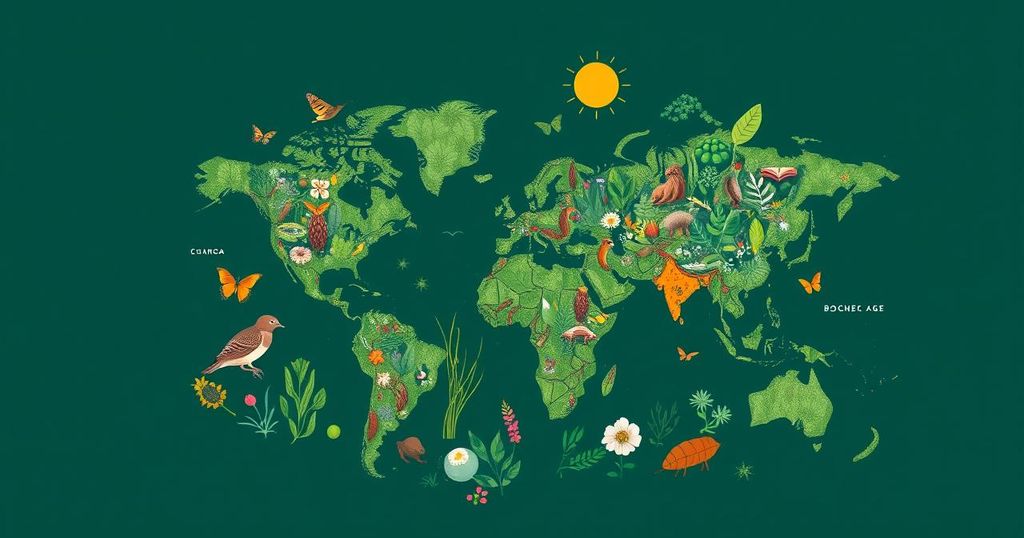Unified Action Required for Biodiversity and Climate Change at COP16
The International Fund for Animal Welfare (IFAW) is advocating for unified international action at the upcoming COP16, emphasizing that biodiversity loss and climate change are interconnected crises. With the conference set to occur in Cali, Colombia, from October 21 to November 1, 2024, IFAW calls for strong collaboration to address these pressing issues, stressing the need to integrate wildlife conservation into climate strategies and protect vital marine ecosystems for their climate regulation roles.
In anticipation of the 16th Conference of the Parties (COP16) to the Convention on Biological Diversity (CBD) scheduled for October 21 to November 1, 2024, in Cali, Colombia, the International Fund for Animal Welfare (IFAW) urges intensified international cooperation to confront the dual crises of biodiversity loss and climate change. Matt Collis, IFAW’s Senior Director of Policy, emphasized the interconnectedness of these crises, stating, “We cannot solve either the climate crisis or biodiversity loss without addressing the other.” He highlighted the significance of COP16 as a critical opportunity to align national and international strategies aimed at safeguarding biodiversity while simultaneously addressing climate challenges. As the inaugural gathering of the globally linked Rio Convention COPs in 2024, COP16 is poised to influence forthcoming environmental discussions, particularly in light of the upcoming United Nations Framework Convention on Climate Change (UNFCCC) COP30, which will necessitate countries to update their climate action plans. The 2023 COP28 Joint Statement on Climate, Nature, and People, signed by the leadership of the Rio Conventions and various global coalitions, reinforces the necessity for cohesive action amongst member nations. IFAW appeals to COP16 participants to ensure these commitments are encapsulated in the summit’s outcomes, particularly in the high-level segment and the Cali Declaration. The protection of marine and coastal biodiversity is also paramount, serving as a crucial resource for both wildlife and humanity. Marine ecosystems are fundamental for biodiversity and play an instrumental role in climate regulation by sequestering carbon and stabilizing weather patterns. However, these ecosystems face growing threats from human activities and climate change effects. Collis remarked, “Healthy oceans are the foundation of a healthy planet. They absorb carbon, mitigate climate impacts, and support rich biodiversity,” urging that the protection of marine ecosystems be prioritized at COP16 to sustain essential ecological functions amid rising climate pressures. Collis concluded with a call to action: “Time is running out to tackle the intertwined crises of biodiversity loss and climate change, but COP16 offers hope. By ensuring that biodiversity and climate efforts are aligned at every level, we can make meaningful progress. The future of our planet depends on it.” Further, IFAW will host an official side event titled “Leveraging Wildlife Conservation and Rewilding to Supercharge Climate Mitigation and Adaptation” on October 24 at 16:30 COT, showcasing the vital contributions of wildlife in combating climate change and launching new guidelines for governments to integrate wildlife conservation into climate strategies. Details of the event can be found at the CBD side-event link.
The upcoming COP16 represents a significant gathering aimed at addressing two of the most pressing global challenges: biodiversity loss and climate change. The CBD aims to encourage international cooperation to protect biodiversity while recognizing the urgent need to address climate change in tandem. As global environmental negotiations evolve, COP16 is seen as a critical stepping stone for aligning efforts across multiple environmental treaties, particularly ahead of COP30. Increased focus on marine and coastal biodiversity underscores the need for integrative approaches to natural resource management that encompass both ecological and climate objectives.
In summary, the 16th Conference of the Parties (COP16) to the Convention on Biological Diversity serves as a pivotal moment for global leaders and environmental advocates to unite in addressing biodiversity loss and climate change. The integrated approach advocated by IFAW and other environmental entities highlights the necessity of synergistic efforts in policy-making and conservation. Protecting our planet’s ecosystems, especially marine environments, is essential for sustaining biodiversity and mitigating climate impacts, ensuring a healthier future for all.
Original Source: www.ifaw.org




Post Comment